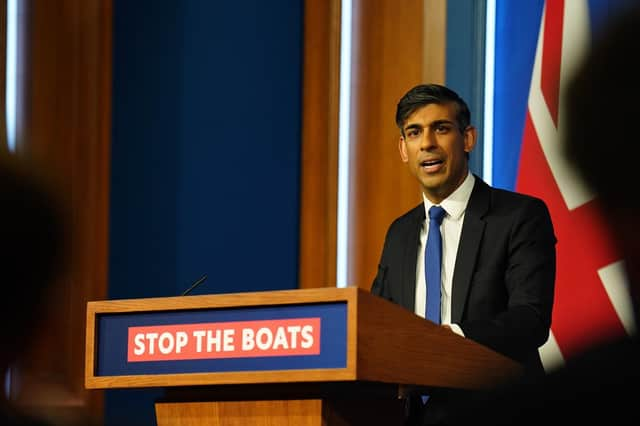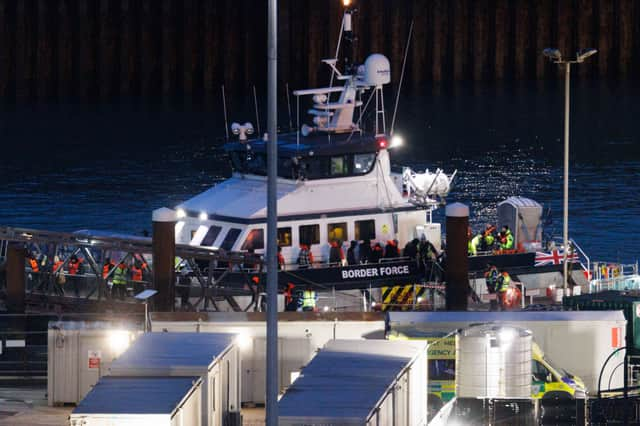House of Lords defeats Rwanda Bill again - what does this mean for Rishi Sunak?
and live on Freeview channel 276
The House of Lords has delayed Rishi Sunak's Rwanda Bill once again, making it more unlikely for flights to take off in the Spring.
The Archbishop of Canterbury and former Tory Cabinet ministers combined to set up a showdown between peers and the Prime Minister over his legislation, which some have argued puts the UK at risk of breaching international law.
Advertisement
Hide AdAdvertisement
Hide AdSunak previously warned the unelected chamber against frustrating “the will of the people” by hampering the passage of his Safety of Rwanda (Asylum and Immigration) Bill, which has already been approved by MPs. Ahead of the next election, Sunak has made “stopping the boats” a key pledge of his leadership.
MPs rejected a raft of changes made to the draft legislation by the House of Lords earlier this week and ministers urged the unelected chamber to help get it on to the statute books. But peers have again pressed their demands for revisions to the bill, including overturning the bid to oust the courts from the process.
What is the Rwanda Bill?
The government wants to send asylum seekers to Rwanda for processing and resettlement, in what has become Sunak's flagship piece of legislation. The Home Office believes this will act as a deterrent to migrants crossing the Channel on small boats, however charities question whether this will work.
The policy, however, was originally declared unlawful by the Supreme Court as it puts asylum seekers at risk of "refoulement", which is when they are sent back to their home country where they are at risk. Sunak hopes to combat this with a twin approach, firstly, signing a treaty with Rwanda which states that anyone the UK sends cannot be deported from east African country.
Advertisement
Hide AdAdvertisement
Hide AdThe second part is this bill, which unilaterally declares Rwanda safe for asylum seekers who arrive on small boats, and disapplies parts of the Human Rights Act to limit the number of legal challenges that migrants can make. The government says that individuals can only legally contest their deportation if they can prove they would face serious and irreversible harm - such as being pregnant or suffering from a very serious illness.


Announcing the bill in the House of Commons, Home Secretary James Cleverly said: "The actions that we are taking, whilst novel, whilst very much pushing at the edge of the envelope, are within the framework of international law.”
He added: “The Prime Minister has been crystal clear that he, and the government that he leads, will not let foreign courts destroy this Rwanda plan and curtail our efforts to break the business model of those evil people-smuggling gangs.”
What did the House of Lords say about Rwanda Bill?
The House of Commons has passed the bill in two separate votes, with a muted Tory rebellion. The legislation is now being debated in the House of Lords. Peers again insisted on an amendment to restore the jurisdiction of domestic courts in relation to the safety of Rwanda and enable them to intervene.
Advertisement
Hide AdAdvertisement
Hide AdThey also renewed their demand for the bill to have “due regard” for domestic and international law and that Rwanda can only be declared safe when the protections in the treaty are fully implemented and while they remain in place.
Other changes included moves to reduce the risk of unaccompanied children being sent to Rwanda and a block on the removal of victims of modern slavery and human trafficking, as well as those who worked with the UK military or government overseas, such as Afghan interpreters.
The seven defeats ensures a further round of “ping-pong” over the Bill, where legislation is batted between the two Houses until agreement is reached. Refugee campaigner and Labour peer Lord Dubs, who fled the Nazis as a child on the Kindertransport scheme, said: “To send a child wrongly assessed as being an adult to Rwanda would be an appalling dereliction of our responsibilities to vulnerable young people.”
Backing the Bill, Tory former cabinet minister Lord Lilley pointed to a precedent for Parliament to declare certain countries as safe.
Advertisement
Hide AdAdvertisement
Hide Ad

He said: “I think we’re making a bit too much of the lack of provisions and safeguards now about one black country, when we had no concerns about a list of white countries."
Arguing the need for the legislation, Government law officer Lord Stewart of Dirleton said: “We cannot allow people to make such dangerous crossings and we must do what we can to prevent any more lives from being lost at sea.
“Neither can we allow our asylum and legal systems to be overwhelmed, our public services to be stretched or the British taxpayer to continue to fund millions of pounds spent every day on hotel costs.”
Justin Welby, the Archbishop of Canterbury, had previously said international human rights law had developed following the horrors committed by Nazi Germany, to act as a “fallback” and “stop” on governments.
Advertisement
Hide AdAdvertisement
Hide AdHe added: “We are not in any situation remotely like that let’s be clear. The government is not doing something on the scale of what we saw at that stage, but the Government is challenging the right of international law to constrain our actions.”
What does this mean for Rishi Sunak?
The latest defeat means MPs will not debate the bill until after the Easter recess, which starts on Wednesday (27 March). House of Commons Leader Penny Mordaunt said the legislation would return to the Commons for 15 April.
Sunak has said he will get flights to take off by Spring, however this protracted battle with the House of Lords could delay this. The government believes that the two Houses will come to a consensus on the bill in the week after recess.
The Times reported that the first flights to Rwanda will likely now be delayed until June, as the Home Office believes it will take six to 10 weeks after the law is passed to overcome any legal hurdles. There are likely to be individual challenges by the migrants who have been selected.
Advertisement
Hide AdAdvertisement
Hide AdRalph Blackburn is NationalWorld’s politics editor based in Westminster, where he gets special access to Parliament, MPs and government briefings. If you liked this article you can follow Ralph on X (Twitter) here and sign up to his free weekly newsletter Politics Uncovered, which brings you the latest analysis and gossip from Westminster every Sunday morning.
Comment Guidelines
National World encourages reader discussion on our stories. User feedback, insights and back-and-forth exchanges add a rich layer of context to reporting. Please review our Community Guidelines before commenting.
